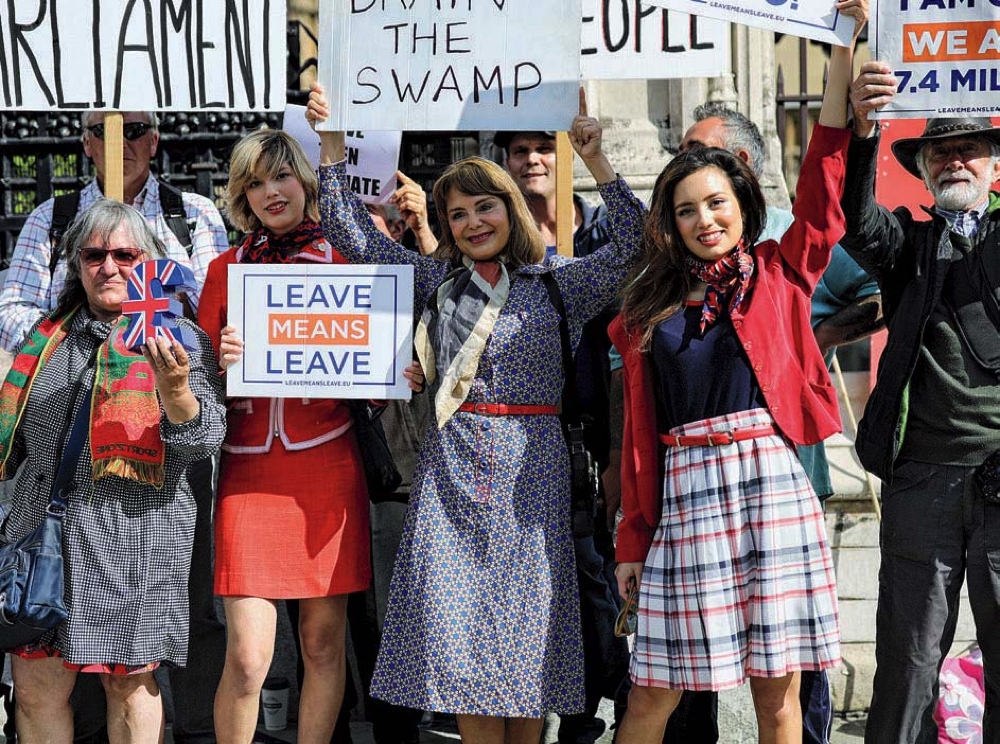In March 2016, days after Donald Trump surged through Super Tuesday toward the Republican presidential nomination, Harvard political scientist Pippa Norris published an online op-ed in The Washington Post that carried a striking data point. In a survey from 2011—well before the candidate’s rise—44 percent of Americans without college degrees approved of having a strong leader who, in the words of the study, “doesn’t have to bother with congress or elections.” Norris warned, “This is not an isolated finding or quirk of fieldwork.”
In the article, headlined “It’s not just Trump. Authoritarian populism is rising across the West,” she sketched out a thesis that has become familiar since the election. Although candidate Trump seemed to some observers to have appeared from nowhere, an unlikely and almost inexplicable figure, Norris placed him in a much larger pattern. For two decades, she wrote, populist authoritarian leaders—appealing to nationalism and tradition, preaching hostility toward outsiders and elites—had attracted swelling support across Europe and the Americas, winning legislative seats and ministerial offices, gaining government power. Trump was a part of the wave.
The phenomenon, she suggested, was not primarily driven by economic inequality and dispossession—just look, she says, at the rise of populist authoritarians in Sweden and Denmark: affluent societies with “cradle-to-grave” welfare systems and well-educated, economically secure populations. Instead, Norris wrote, “populist authoritarianism can best be explained as a cultural backlash in Western societies against long-term, ongoing social change.” Drawing on data that included the World Values Survey, an international research project tracking attitudes and beliefs in nearly 100 countries (she is a board member), Norris argued that as societies have grown more liberal on social issues during the last half-century—more open to diversity and LGBTQ rights, more egalitarian about gender roles and racial equality, more expansive in democratic representation, more secular, more cosmopolitan, more global—that transformation has triggered a deep and intense reaction among traditionalists who feel threatened, marginalized, and left behind. Those traditionalists, whom she identifies as older, whiter, more rural, and less well educated, have tended to turn toward forceful leaders promising to hold back the rising tide.
To her, all this seemed like common sense. The parallels between the 2016 election and the hard-line European parties she had been studying for more than a decade—France’s National Front, the UK Independence Party, the Swedish Democrats, the Danish People’s Party, the Alternative for Germany, Hungary’s Jobbik, Greece’s Golden Dawn—were unmistakably clear. “I thought everybody already kind of knew what I was saying,” recalls Norris, the McGuire lecturer in comparative politics at the Harvard Kennedy School (HKS), where she has taught since 1992. Norris found herself inundated with responses from readers, some of whom wanted to argue, but many more who were simply astonished. And so a few months later, about the time Trump was accepting his party’s nomination, she and her longtime collaborator, Ronald Inglehart, a political scientist at the University of Michigan, expanded the essay into a working paper—itself widely cited—and then into a book, Cultural Backlash: Trump, Brexit, and Authoritarian Populism, which appeared in February 2019, dense with data and footnotes. The cover featured an image of three world leaders, lined up next to each other like faces on an alternate Mount Rushmore: Donald Trump, France’s Marine Le Pen, and Hungary’s Viktor Orban.
Exploding America’s Myths
As a scholar of contemporary global politics, Norris is a curious figure—influential but restless, leapfrogging from subject to subject, conundrum to conundrum. “I look for problems, basically,” she says. “And I try to find good evidence and interesting ways to think about what’s happening. And then I move on to other problems.” In an academic career spanning not quite 40 years, she has written two dozen books and edited two dozen others, examining gender politics, the digital divide, media, political communications, religion and politics, elections, public opinion, democratic institutions and cultures, voter trust, and voting behavior. What unites this constellation of interests is the breadth of Norris’s comparisons. It’s not unusual for her to absorb and analyze data from 30 or 40 countries—or 100. “Inglehart, my co-author, has always said that you can either fly over a place and get the big view, or you can walk in the fields and get the small view,” she says. “And they’re both useful, and lots of people are walking in the fields, which is great. They’re telling us details about what’s happening. But you also need people who can go over it all and see patterns—to see, for example, that Trump isn’t just Trump. Because if you only see him that way, then you mistake the evidence.”

Photograph by Michele Tantussi/Getty Images
This broad focus developed by degrees. Norris grew up in the middle-class London borough of Richmond upon Thames, where her father was a pharmacist and her mother stayed home. She was one of the first in the family to attend college, earning a joint honors degree in politics and philosophy at the University of Warwick. “I didn’t want to go to Oxford,” she says. “I wanted to go somewhere that was new.” Warwick was founded in 1965; Norris arrived six years later, when “It was still being built.” The student body was small: “That was quite exciting—I was more engaged in developing that university than almost anything I’ve done in my life. They were known as ‘white tile universities,’ or ‘red brick universities,’ these brand-new universities founded by the Labour Party” and located in major industrial cities. “The idea was there’d be much less emphasis on class.” From Warwick, she went on to a Ph.D. in politics at the London School of Economics, followed by teaching positions at Northumberland University in Newcastle and then Edinburgh University, where she focused on British elections.
In 1992, she came to Harvard on sabbatical and never left, transitioning from a visiting lectureship to a named one. For several years, she was also associate director of research at HKS’s Shorenstein Center on the Press, Politics, and Public Policy. She has sometimes taught classes in the Law School and the government department. Working at Harvard, she says, “forced me to go worldwide in thinking about data sets and evidence and theories, because coming here, you can’t teach about British elections, because nobody cares.” Even focusing on Europe seemed too narrow. “So I began trying to understand the issues in a much broader global context. And I always bring the United States in as one of the countries in my comparisons,”she adds. “You know, in America, they think that comparative politics means looking at the rest of the world. Like, ‘America’s not part of that.’” She laughs. “Oh sorry, it is!”
Those comparisons sometimes have a way of undercutting Americans’ collective mythology. Since 2012, Norris has directed the Electoral Integrity Project, an initiative she co-founded to evaluate the quality of elections around the world. The project is based at Harvard and the University of Sydney in Australia, where Norris is a professor of government and international relations, and it analyzes problems that occur throughout the electoral cycle, from media coverage to campaign finance, electoral law and procedures, district boundaries, party registration, voting, the vote count, election results, and the authorities who oversee the process. Norris and her colleagues collect data from rolling surveys sent in by thousands of social scientists and election experts in more than a hundred countries. The resulting “perception of electoral integrity” score runs from zero to 100. One thing she’s learned, she says, is that “Institutions are really important.” And governments with multiparty elections and power-sharing arrangements—as in Switzerland, Belgium, and the Netherlands—fare better than places like the United States and the UK, with winner-take-all elections: “The rules of the game matter a lot.”
The United States consistently scores lowest among established democracies. “And it’s not just one election,” Norris says—she and her colleagues have found this to be true in every election they surveyed. The group’s most recent report, issued in May 2019, gave the United States a score of 61, on par with Mexico and Panama—and 10 to 20 points behind its European peers and Anglo-American democracies like Australia and New Zealand.
One overarching problem with American elections, Norris says, is partisanship. Decisions about voter registration and electoral procedures and district boundaries—which, ideally, she suggests, should be handled by an independent authority—are instead left to politicians in state houses and city halls. And unlike other Western democracies, the United States lacks professionally trained poll workers and does not set uniform standards across all polling places. After the disputed results in Florida during the 2000 presidential election, she adds, a flurry of new voting restrictions in some states have disproportionately disenfranchised voters who are poor or young or mobile, minority groups, and senior citizens. The result of all this, wrote Norris in a 2016 book titled Why American Elections Are Flawed (And How to Fix Them), is a “bewildering hodgepodge of state laws and local procedures determining some of the most basic electoral procedures and voting rights.”
The places that score highest on Norris’s index are Nordic countries—Denmark, Finland, Norway, Sweden, Iceland—as well as Germany, the Netherlands, and Canada. Some newer democracies also perform very well, she says: Uruguay, Costa Rica, Latvia, Lithuania, Slovenia, South Korea, Benin.
The Rise of the Authoritarians
The rise of populist authoritarianism began to catch Norris’s attention a decade or so ago. In 2006, she took a leave of absence from Harvard to spend a year and a half at the United Nations Development Programme (UNDP) as director of democratic governance, working to strengthen and support democratic governments and nongovernmental organizations in UN member states. “It was the largest practice in the whole of the UNDP,” she says. Each country had different gaps that required different strategies. “So in Syria, you might do things like helping public administration or improving municipal government, and in Ghana, you might help with elections or human rights or women’s empowerment.” In the classroom, Norris had been teaching about the Third Wave of democratization spreading through southern Europe, Latin America, and Asia beginning in the 1970s (the first wave began during the 1800s with white male suffrage in the United States; the second began after World War II). All the indicators seemed to point toward steady expansion of democratic rights.
“We have to re-examine some of our assumptions. We have good explanations for why countries democratize, not for why they find authoritarianism attractive.”
“So, the idea that authoritarianism would make a comeback…” Norris trails off. “But of course, nowadays, what we can plainly see is that the trends globally show the levels of democracy going down.” Hybrid regimes, whose electoral mechanisms combine democratic and autocratic elements, are most immediately at risk of receding into electoral autocracies, as seems to be occurring in Hungary and Turkey, and perhaps even India. In those countries, Norris says, “Elections are being manipulated, and the judgeships are packed with partisans. You find that the parliaments have weakened, and the free press is really under threat. Nationalism is raising its head.” Social science, she says, doesn’t yet have a clear explanation for this reversal. “It means we have to re-examine some of our assumptions,” she says. “We have good explanations for why countries democratize, not for why they find authoritarianism attractive.”
The theory she and Inglehart put forward in Cultural Backlash begins with the concept of a “silent revolution,” which he first documented 40 years ago: the gradual but steady spread of socially liberal ideas in Western democracies beginning during the early civil-rights era and gaining momentum through the 1960s and ’70s, as each successive generation, with increased education and urbanization, pushes further away from the traditional values that baby boomers and their parents were raised with. During the past 20 years, countries like the United States have been approaching a tipping point, Norris says, in which traditionalists, once accustomed to easy predominance and a national culture that reflected their values, now find themselves newly—but still barely—in the minority and feeling insecure; meanwhile, they still make up a majority of people who actually vote. “And so an authoritarianism reflex kicks in,” she says. “They want a strong leader who can push back. A transgressive leader, who doesn’t care if it’s politically correct.”
In 2018, a few months before Cultural Backlash was released, Norris delivered a talk at the University of Wisconsin, laying out its major findings and arguments. The screen at the front of the auditorium flashed with one graph after another, charting voters’ education levels and authoritarian values, moral conservatism, income gaps, generational turnover. During the question period that followed, one faculty member stood to ask a “short but very provocative” question: did Norris believe that this cultural backlash might actually imperil the silent revolution that precipitated it? Or was she confident that eventually the backlash would die out? These are questions Norris hears a lot. Her answer is only partly reassuring: “In the long term, yes,” she says—the backlash will not swamp the stronger forces of social liberalization. But the tipping point—this moment that the United States and other Western democracies find themselves in now—“is the maximum point of conflict, when people become aware of the differences, become aware of the loss.” Americans are in the early stages of what Norris predicts will be the most intense period of anger, on both sides. She told the audience in Wisconsin, “This is a problem for the next 30 years.”
Norris and Inglehart’s argument relies in part on a number of large social-science surveys—some global, others focused on particular countries or regions—that try to get at people’s deeper values and attitudes, rather than opinions on particular issues or events. The World Values Survey and the European Social Survey, for example, seek to predict how people might behave in particular political contexts. Others, like the Chapel Hill Expert Survey and the Expert Judgment Survey of European Political Parties, track the policies, positions, and ideologies of national parties.

Brexit supporters demonstrate outside the Houses of Parliament in September 2019.
Photograph by Aaron Chown/PA Images via Getty Images
What Norris and Inglehart found points to an uptick in what they define as authoritarian values: the importance respondents place on security and order, and on conventionalism. “Because they feel under threat from the outside,” Norris says, “they are hostile to outsiders”—often those with different religious or ethnic backgrounds. Another authoritarian value is loyalty to the leader: someone “who protects the tribe and reinforces the norms that are seen as morally right.” Some observers have spelled out more proximate motivating factors in recent elections in the United States and abroad: racism, xenophobia, homophobia, sexism, nativism. But the deeper motivation underlying those attitudes, Norris maintains, is a turn toward authoritarian values. Her research compares data on that rise, and on other factors like moral conservatism and education level, with election outcomes in various Western democracies. In country after country, they coincide: as the numbers go up for authoritarian values and social conservatism, so do the vote tallies for authoritarian political parties.
Norris takes seriously the most widely cited competing argument—that elections of leaders like Trump, and the passage of the Brexit referendum in the United Kingdom, are part of a revolt against economic inequality and reflect the resentment of those who feel left behind in the global economy. Cultural Backlash devotes a chapter to analyzing that view. But the data show a much more mixed picture: if economic grievance were really an underlying cause, Norris says, she would expect to find solid support for Trump among the working poor in inner cities and the unemployed. Instead, she finds that income level is not a reliable predictor of support for authoritarian parties: the urban poor voted against Trump, and many higher-income Americans voted for him. A similar dynamic holds for Brexit support, the other major case study in Cultural Backlash. The highest economic correlation of support for Trump was among voters who were neither rich nor poor, but moderately well off. Norris sees economic inequality and the decline of industrial jobs as accelerants to votes for authoritarian leaders, but not by themselves a root cause. “You can use the economic thesis to explain certain cases in some ways, and it fits sometimes,” she says. “But it doesn’t fit the big pattern.”
Similarly, she argues that social media, also frequently blamed for worsening polarization, plays a supporting, not a causal, role. Norris points out that email and the first visual Internet browsers started appearing in the early 1990s, and social media did not launch in a widespread way until a decade later. By then, authoritarian political parties were already gaining strength and popularity. “The timing of the growth of social media doesn’t fit the timing of the growth of these parties,” she says. “It does reinforce the bubble mentality, the feeling of us-versus-them. But the underlying tides had already started to take effect.”
Norris is carefully precise in her definition of populism, and careful also to distinguish it from authoritarianism, which it often—but not always—accompanies. Populism, she explains, is a type of rhetoric, an anti-establishment impulse: a belief that political power should reside not with economic, intellectual, or political elites, but with the people. In both the United States and Europe there exist populist parties that are also socially liberal—Spain’s Podemos Party, Greece’s Syriza, the Left party in Germany, the Socialist party in the Netherlands. In the United States, Bernie Sanders is a politician who combines populist, anti-elite rhetoric with socially liberal values. But more often, Norris observes, populist sentiment opens the door to authoritarianism, “Because it says that you can’t trust your legislators, even though they are elected; it says your representative won’t act for you, that parties are corrupt.” The problem is that populism is rhetoric without policy: “It’s like a barnacle that attaches itself to a rock.” In theory, it should lead to direct forms of popular democracy. But those mechanisms are often weak and difficult to organize and administer, “so in practice what happens is that the power comes to reside in an individual, charismatic leader, who represents the voice of the people.”
* * *
This past fall, for the second year, Norris taught a Kennedy School course called “The Rise of Authoritarian Populism.” It surveyed the phenomenon around the globe, and the classroom filled up with students from many of the places her research covers: Hungary, Venezuela, Israel, Mexico, Germany, China, the United States. In late September, class discussion centered on the Brexit vote. “If this is a crisis, who’s to blame?” Norris asked, before laying out her cultural-backlash theory, noting that income inequality in the UK is not extreme, and that the economy was growing at the time of the 2016 referendum. One student, who was Pakistani and lived in the UK, raised his hand and recalled flying into London the day after the vote. On the train ride from Gatwick into the city, he said, “Two people said to me, ‘We voted for you to leave; you should leave.’ That’s what they thought Brexit meant.” Two weeks later, a cab driver told him something similar.
Norris nodded. “The issue of race and immigration and the backlash that’s happening there—it’s really critical to see how it was framed in the referendum vote,” she said, “and what issues it was paired with, and whom it was meant to appeal to.” She spoke again about societal changes and cultural tipping points and the intensifying anger in politics. On issues like immigration and race, or “patriotism, or the memory of empire,” social conservatives see their numbers shrinking. “And so, what’s happened is that a group that felt under threat has come back and had an authoritarian reflex.”









